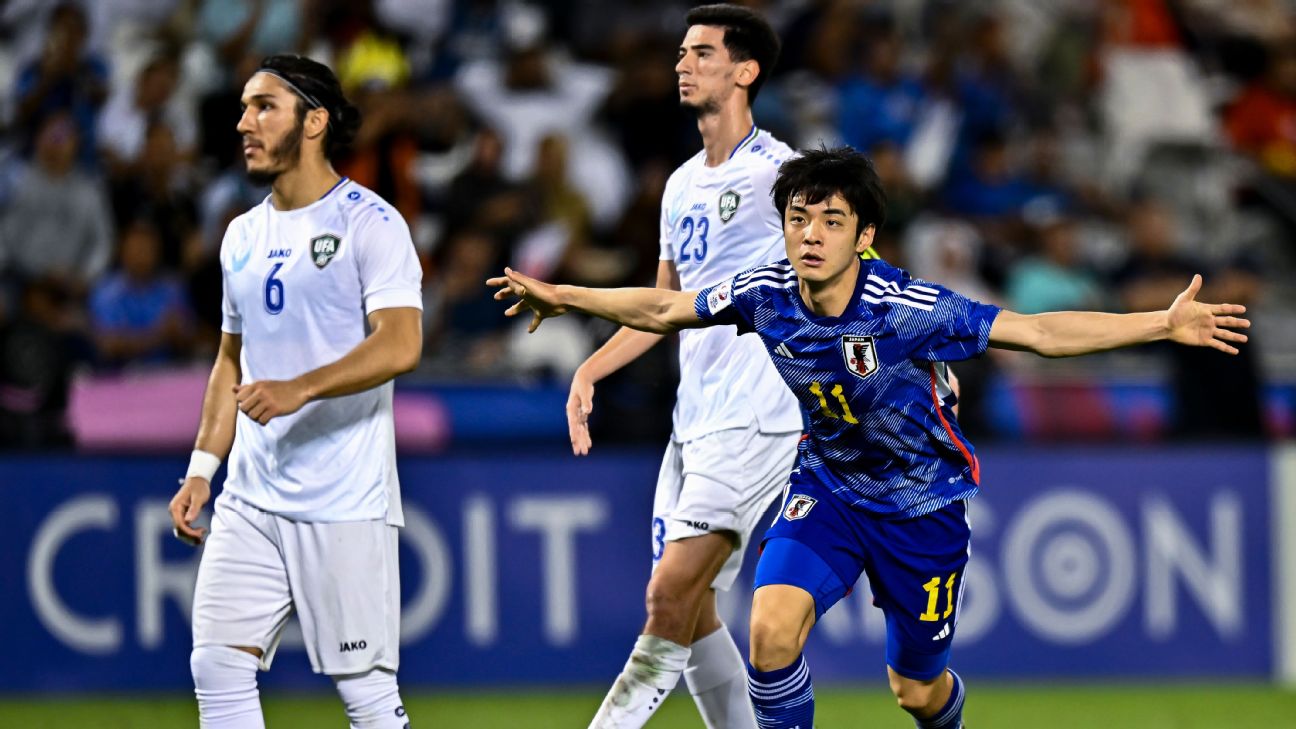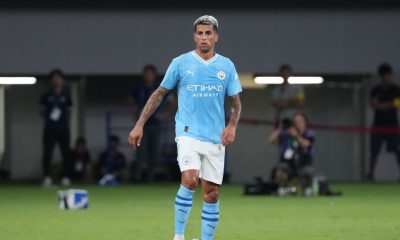With the Summer Olympics here once more, Asian football will again be hunting for a men’s football medal that has historically proven elusive.
Only twice before have a team from the continent finished on the podium: most recently when South Korea finished third in 2012 but, before that, all the way back in 1968 when Japan claimed the bronze medal.
This year, Asia will have three representatives — but are any a real chance of medalling?
Previous appearances: 5 (1980, 1984, 1988, 2004, 2016)
Best finish: 4th (2004)
Fixtures:
Squad:
- Goalkeepers: Hussein Hassan (Al Karkh), Kumel Al-Rekabe (Naft Al-Basra)
- Defenders: Josef Al-Imam (BK Olympic, Sweden), Hussein Ali (Heerenveen, Netherlands), Saad Natiq, Mustafa Saadoon (both Air Force Club), Ahmed Maknzi (Erbil), Zaid Tahseen, Karrar Saad (both Al Talaba)
- Midfielders: Ali Jasim, Ibrahim Bayesh (both Air Force Club), Muntadher Mohammed (Mes Rafsanjan, Iran), Karrar Mohammed, Nihad Mohammed (both Al Talaba), Muntadher Abdul-Amir (Al Zawraa)
- Forwards: Hussein Abdullah (Al Talaba), Youssef Amyn (Eintracht Braunschweig, Germany), Aymen Hussein (Air Force Club)
*Overage players in italics
Key player: Aymen Hussein — With 76 senior caps to his name, the inclusion of the 28-year-old as one of three overage players will offer a real presence in attack. Hussein is already Iraq‘s joint-6th highest scorer of all time and his experience will be crucial coming up against some stern defences.
One to watch: Ali Jasim — Regarded as Iraq’s brightest prospect for some time now, Jasim’s reputation continues to grow despite him still being 21. He was the undoubted star of their third-place finish at the AFC U-23 Asian Cup earlier this year — which booked their ticket to Paris — and could just use the Games as a platform to showcase his exciting abilities to a far bigger audience.
Prediction: Iraq are no strangers to the men’s football tournament and 2024 will mark their 6th appearance — with their best display being a fourth-place finish two decades ago. After some testing times, the Lions of Mesopotomia are regarded as a team on the rise with plenty of talented prospects in their ranks. Nonetheless, coming up against stern tests in the form — especially in the form of Argentina and Morocco — could just mean that progress out of the group stage might be beyond them.
Previous appearances: None
Best finish: –
Fixtures:
- July 24: vs. Spain
- July 27: vs. Egypt
- July 30: vs. Dominican Republic
Squad:
- Goalkeepers: Abduvohid Nematov (Nasaf Qarshi), Vladimir Nazarov (Pakhtakor)
- Defenders: Saidazamat Mirsaidov, Asadbek Rakhimzhonov (both Olympic Tashkent), Abdukodir Khusanov (Lens, France), Husniddin Aliqulov (Çaykur Rizespor, Turkey), Mukhammadkodir Khamraliev (Pakhtakor), Ibrokhimkhalil Yuldoshev (Kairat, Kazakhstan), Zafarmurod Abdurakhmatov (Nasaf Qarshi)
- Midfielders: Jasurbek Jaloliddinov (Neftchi Fergana), Umarali Rakhmonaliev (Rubin Kazan, Russia), Diyor Kholmatov (Pakhtakor), Abdurauf Buriev (Olympic Tashkent)
- Forwards: Abbosbek Fayzullaev (CSKA Moscow, Russia), Ruslanbek Jiyanov (Navbahor Namangan), Khusayin Norchaev (Neftchi Fergana), Oston Urunov (Persepolis, Iran), Eldor Shomurodov (Cagliari, Italy)
*Overage players in italics
Key player: Eldor Shomurodov — Arguably Uzbek football’s most prominent export of all time, Shomurodov’s credentials speaks for itself given he has spent the last four seasons plying his trade in Serie A. There is also a real possibility that the 29-year-old will be extra motivated to fire the White Wolves to glory in Paris, especially after he missed this year’s AFC Asian Cup — a tournament he was expected to star in — through injury.
One to watch: Abdukodir Khusanov — One of a growing number of Uzbek prospects to earn a move to Europe early in their careers, Khusanov became the first footballer from his nation to play in Ligue 1 last July when he debuted for Lens. The calm and assured centre-back will get the chance to test himself further at the Olympics, especially coming up against some formidable opposition attackers.
Prediction: Although they are making their tournament debut, Uzbekistan could just be dark horses in Group C. Spain will be the favourites but are not fielding their strongest side, while ties against Egypt and Dominican Republic could both, on paper at least, prove to be keenly contested affairs. Don’t be too surprised if Uzbekistan sneak their way into the knockout stage.
Previous appearances: 11 (1936, 1956, 1964, 1968, 1996, 2000, 2004, 2008, 2012, 2016, 2020)
Best finish: 3rd (1968)
Fixtures:
Squad:
- Goalkeepers: Leo Kokubo (Sint-Truiden, Belgium), Taishi Brandon Nozawa (FC Tokyo)
- Defenders: Riku Handa (Gamba Osaka), Ryuya Nishio (Cerezo Osaka), Hiroki Sekine (Kashiwa Reysol), Seiji Kimura (Sagan Tosu), Kota Takai (Kawasaki Frontale), Ayumu Ohata (Urawa Red Diamonds)
- Midfielders: Sota Kawasaki (Kyoto Sanga), Rihito Yamamoto, Joel Chima Fujita (both Sint-Truiden, Belgium), Koki Saito, Shunsuke Mito (both Sparta Rotterdam, Netherlands), Ryotaro Araki (FC Tokyo)
- Forwards: Shota Fujio, Yu Hirakawa (both Machia Zelvia), Mao Hosoya (Kashiwa Reysol), Kein Sato (Werder Bremen, Germany)
*Japan opted against selecting any overage players.
Key player: Leo Kokubo — With coach Go Oiwa a fan of regularly rotating his outfielders, Kokubo looms as the one player destined to feature most prominently for Japan. After coming through the ranks of Primeira Liga giants Benfica, the 23-year-old recently sealed a move to Belgian Pro League outfit Sint-Truiden and remains a legitimate chance to make the grade in Europe.
One to watch: Shota Fujio — The lanky striker may have started the season flying under the radar given he does not play for one of the J1 League‘s powerhouses, but Machida Zelvia‘s stunning campaign so far — with the newly-promoted side incredibly leading the competition — has seen them and Fujio rise to prominence. With a creditable haul of eight goals in the league so far in 2024, Fujio also played his role when Japan won the U-23 Asian Cup back in May even if he failed to get on the scoresheet.
Prediction: The Samurai Blue are Asia’s most frequent feature in Olympic men’s football with a record 12 appearances but recent campaigns have ended in heartbreak. In both 2012 and 2020, they did well to reach the semifinals but ultimately finished fourth and missed out on a medal. They will be determined to go one step further this time around and look an excellent chance of perhaps even topping Group D, although it remains to be seen whether the current crop — a well-rounded squad but without real star quality — has what it takes to medal, especially without any overage players to call upon.













